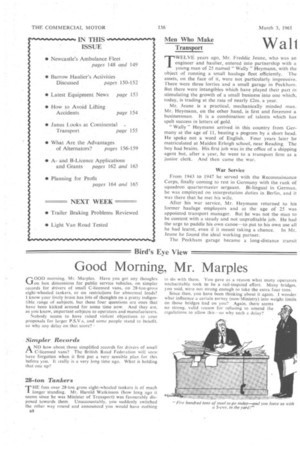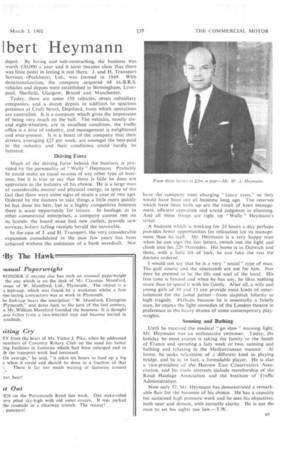Wall
Page 36

Page 37

If you've noticed an error in this article please click here to report it so we can fix it.
Ebert Heymann
TWELVE years ago, Mr. Freddie Jeune, who was an engineer and haulier, entered into partnership with a young man of 25 named " Wally " Heymann, with the object of running a small haulage fleet efficiently, The assets, on the face of it, were not particularly impressive. There were three lorries and a small garage in Peckham. But there were intangibles which have played their part in stimulating the growth of a small business into one which, today, is trading at the rate of nearly Um. a year.
Mr. Jeune is a practical, mechanically minded man. Mr. Heymann, on the other hand, is first and foremost a businessman. It is a combination of talents which has spelt success in letters of gold. • " Wally " Heymann arrived in this country from Germany at the age of 11, beating a pogrom by a short head. He spoke not a word of English. Four years later he matriculated at Maiden Erleigh school, near Reading. The boy had brains. His first job was in the office of a shipping agent but, after a year, he went to a transport firm as a junior clerk. And then came the war.
War Service
From 1943 to 1947 he served with the Reconnaissance Corps, finally coming to rest in Germany with the rank of squadron quartermaster sergeant. Bi-lingual in German, he was employed on interpretation duties in Berlin, and it was there that he met his wife.
After his war service, Mr. Heymann returned to his former haulage employers and at the age of 25 was appointed transport manager. But he was not the man to be content with a steady and not unprofitable job. He had the urge to paddle his own canoe—to put to his own use all he had learnt, even if it meant taking a chance. In Mr. Jeune he found the ideal working partner.
The Peckham garage became a long-distance transit depot. By hiring and sub-contracting, the business was worth £20,000 a year and it soon became clear that there was little point in letting it rest there. J. and H. Transport Services (Peckham), Ltd., was formed in 1949. With denationalization, the company acquired 48 ex-B.R.S. vehicles and depots were established in Birmingham, Liverpool, Sheffield, Glasgow, Bristol and Manchester.
Today, there are some 150 vehicles, seven subsidiary companies, and a dozen depots in addition to spacious premises at Croft Street, Deptford, from which operations are controlled. It is a company which gives the impression of being very much on the ball. The vehicles, mostly sixand eight-wheelers, are in excellent condition, the traffic office is a hive of industry, and management is enlightened and ever-present. It is a boast of the company that their drivers, averaging £25 per week, are amongst the best-paid in the industry and their conditions could hardly be bettered, Driving Force Much of the driving force behind the business is provided by the personality of " Wally " Heymann. Probably he could make an equal success of any other type of business, but it is true to say that there is little he does not appreciate in the industry of his choice. He is a large man of considerable mental and physical energy, in spite of the fact that there were some signs of strain a. year or two ago. Ordered by the doctors to take things a little more quietly he has done his best, but in a highly competitive business there is scant opportunity for leisure. In haulage, as in other commercial enterprises, a company cannot rest on its laurels: the board must find new outlets, provide new services, before falling receipts herald the inevitable.
In the case of J. and H. Transport, the very considerable expansion consolidated in the past few years has been achieved without the assistance of a bank overdraft. Nor
have the company been charging "fancy rates," or they would have been out of business long ago. The reserves which have been built up are the result of keen management, efficient operation and sound judgment in planning. And all these things are right up " Wally " Heymann's street.
A business which is working for 24 hours a day perhaps provides fewer opportunities for relaxation for its management than its staff. Mr. Heymann is a very happy man when he can sign the last letters, switch out the light and climb into his 220 Mercedes. His home is in Dulwich and there, with a little bit of luck, he can take the rest the doctors ordered.
1 would not say that he is a very " social " type of man. The golf course and the nineteenth are not for him. Nor does he pretend to be the life and soul of the local. His free time is limited and when he has any, he likes nothing more than to spend it with his family. After all, a wife and young girls of 10 and 13 can provide most kinds of entertainment for the jaded parent—from slapstick hilarity to high tragedy. Perhaps because he is essentially a family man, he enjoys the light comedies of the London theatre in preference to the heavy drama of some contemporary playwrights.
Sunning and Bathing Until he received the medical "go slow" warning light. Mr. Heymann was an enthusiastic swimmer. Today, the holiday he most enjoys is taking the family to the South of France and spending a lazy week or two, sunning and bathing and relaxing in the Mediterranean manner. At home, he seeks relaxation of a different kind in playing bridge, and he is, in fact, a formidable player. He is also a vice-president of the Harrow East Conservative Association, and his trade interests include membership of the Road Haulage Association and the Institute of Traffic Administration.
Now only 37. Mr. Heymann has demonstrated a remarkable flair for the business of his choice. He has a capacity for sustained high pressure work and he sees his objectives. both near and distant, with enviable clarity. He is not the man to set his sights too




































































































































